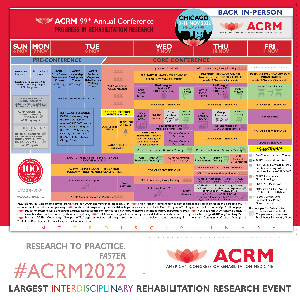Back
Clinical Practice (assessment, diagnosis, treatment, knowledge translation/EBP, implementation science, program development)
Evaluating the ICF Framework as a Model of Community Participation for People with Disabilities
Thursday, November 10, 2022
3:40 PM – 3:45 PM
Location: Station 2
- AC
Ada Chen, PhD, MPH, CRC
Postdoctoral Fellow
Kessler Foundation
east hanover, New Jersey, United States
Presenting Author(s)
Research Objectives: To evaluate ICF constructs (demographic covariates, impairment-related symptoms, functional disabilities, contextual factors)as predictors of community participation in a sample of individuals with chronic health conditions and disabilities living in the community
Design: Survey: an abbreviated ICF measurement battery was designed to assess high-order descriptors. A hierarchical regression analysis was conducted.
Setting: General community
Participants: A convenient sample of 952 people with disabilities and over 18 years of age were recruited via Amazon Mechanical Turk.
Interventions: Not applicable
Main Outcome Measures: Main outcome is level of Community participation. It is assessed by Wisconsin Community Participation Scale, which includes 12 meaningful roles. Final score is calculated based on the perceived importance and participation level of each role.
Results: Older age, low income, higher functional disability were negatively associated with community participation. Married, educated, hope, core self-evaluation. positive social support and environmental were positive predictors of community participation. These predictors accounted for 48% (R^2 = .48, f
^2 = .92) of the variance in community participation scores (a large effect size). The results support the utility of the ICF as a model of community participation for people with chronic health conditions and disabilities.
Conclusions: Findings of the present study: (1) underscored the significant negative effect of functional disability on community participation; (2) provide strong empirical evidence to support the use of the ICF model of community participation as a theoretical model for case conceptualization, assessment, treatment plan development, and selection of empirically supported interventions to help people with chronic health conditions and disabilities continue to assume meaningful life roles in the community during and after the health crisis.
Author(s) Disclosures: The author has no conflict of interest
Design: Survey: an abbreviated ICF measurement battery was designed to assess high-order descriptors. A hierarchical regression analysis was conducted.
Setting: General community
Participants: A convenient sample of 952 people with disabilities and over 18 years of age were recruited via Amazon Mechanical Turk.
Interventions: Not applicable
Main Outcome Measures: Main outcome is level of Community participation. It is assessed by Wisconsin Community Participation Scale, which includes 12 meaningful roles. Final score is calculated based on the perceived importance and participation level of each role.
Results: Older age, low income, higher functional disability were negatively associated with community participation. Married, educated, hope, core self-evaluation. positive social support and environmental were positive predictors of community participation. These predictors accounted for 48% (R^2 = .48, f
^2 = .92) of the variance in community participation scores (a large effect size). The results support the utility of the ICF as a model of community participation for people with chronic health conditions and disabilities.
Conclusions: Findings of the present study: (1) underscored the significant negative effect of functional disability on community participation; (2) provide strong empirical evidence to support the use of the ICF model of community participation as a theoretical model for case conceptualization, assessment, treatment plan development, and selection of empirically supported interventions to help people with chronic health conditions and disabilities continue to assume meaningful life roles in the community during and after the health crisis.
Author(s) Disclosures: The author has no conflict of interest
Learning Objectives:
- have a better understanding of the ICF as a model for participation and disability
- use the ICF as a theoretical model for case conceptualization, assessment, treatment plan development, and selection of empirically supported interventions
- have a better understanding of psychosocial aspects of disability, and psychosocial predictors for community participation

.jpg)
